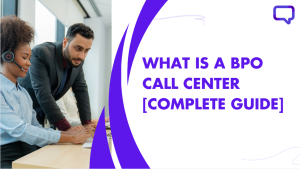As companies increasingly switch towards chatbots and automated customer support, you might think customers don’t call business all that much.
Spoiler alert: They do.
According to Zendesk CX trends report, people still use phones to resolve their issues with companies.
Your business might have to handle two types of calls: Inbound and Outbound.
Think of inbound calls as guests knocking on your door. You welcome them, listen to their stories, and help out. They’re reaching out to you, after all. They want your help.
Outbound calls, on the other hand, are like you stepping out, looking for folks who might need what you’ve got. It’s about making the first move, offering help, or sharing something exciting. They might not want your help but you’re still looking if they do.
Why does this matter, you ask? Well, in the grand scheme of business, mastering both can help your business generate…more business.
That was a very basic explanation of inbound and outbound calls – let’s dive a little deeper.

Inbound Calls
Inbound calls are like receiving a digital handshake. They happen when customers pick up the phone to seek your help or ask about what you offer. Imagine someone calling to ask if your café serves gluten-free options – that’s inbound!
What Makes Inbound Calls Important?
These calls are crucial because they’re initiated by customers looking for solutions or information directly from you. These calls are easier to turn into $$$. Why?
Because they reached out to you.
They are almost ready to buy.
They just need a little nudge.
Listen closely, provide clear answers, and always aim to exceed expectations. It’s your chance to turn inquiries into lasting relationships.
How Do I Handle Inbound Calls?
Quite simply, there are 2 ways to handle such calls: In-house team or outsourcing to a call center.
In-house teams offer direct control over the customer service process, ensuring that your brand voice remains consistent. This allows for immediate feedback and adjustments, fostering a deep understanding of your customer base.
Outsourcing in bound call centers, however, gives you several advantages such as cost efficiency, the ability to offer 24/7 support, and access to a global talent pool. While it may seem like a step away from direct control, reputable outsourcing partners specialize in representing brands faithfully, leveraging their expertise to provide high-quality customer service.
Services Offered by Inbound Call Centers
Customer Service and Support: Inbound call centers are primarily known for handling customer queries. They deal with a range of issues, from product support to account updates.
Technical Assistance: Agents provide technical support, guiding customers through troubleshooting or escalating complex issues to specialists.
Payment and Order Processing: These centers process orders and payments over the phone, assisting customers with purchases and billing inquiries.
Subscription Management: Agents handle plan upgrades or renewal email requests, ensuring customers can easily modify their subscriptions.
Outsource Inbound Calls Today (Start from $7/hr)

Outbound Calls
Outbound calls are your business reaching out to the world. Think of it as casting a net to see who might be interested in the treasure you have. Whether it’s to inform them about a new product, offer customer support follow-ups, or even gather feedback, these calls are proactive. You’re making the first step towards building a relationship or enhancing an existing one.
Does Your Business Need Outbound Calls?
Outbound calls are essential for a few reasons:
Expansion: They help you tap into new markets and reach potential customers who aren’t aware of you yet.
Feedback: They’re a great way to collect valuable insights directly from your audience, which can guide product development or improvement.
Retention: Following up with customers can boost satisfaction and loyalty. A simple check-in call can make customers feel valued and heard.
How to Conduct Effective Outbound Calls?
Success in outbound calling requires a blend of strategy and empathy. Here are key tactics:
Personalization: Tailor your calls to the recipient. Use their name and reference any past interactions. This shows you pay attention and care.
Timing: Choose the right time to call. Research the best times when your potential customers are more likely to be available and receptive.
Purpose: Be clear about why you’re calling. Clarity makes a difference, whether it’s to offer help, ask for feedback, or introduce something new.
Services Offered by Outbound Call Centers
Sales and Telemarketing: These services focus on generating leads, closing sales, or promoting new products. It’s all about turning prospects into paying customers.
Customer Satisfaction Surveys: Through outbound calls, businesses can gather feedback on their products, services, or overall customer experience. This information is gold for improvement.
Appointment Scheduling: Outbound call agents can help in setting up appointments, making it easier for sales teams to focus on their meetings rather than on coordination tasks.
Debt Collection: For businesses involved in financial services, outbound calls are used for reminders or to manage debt collection, combining tact with firmness.

![What is Shrinkage in the Call Center [Updated 2025]](https://www.hiredsupport.com/wp-content/uploads/2025/04/What-is-Shrinkage-in-Call-Center-1-300x169.png)
